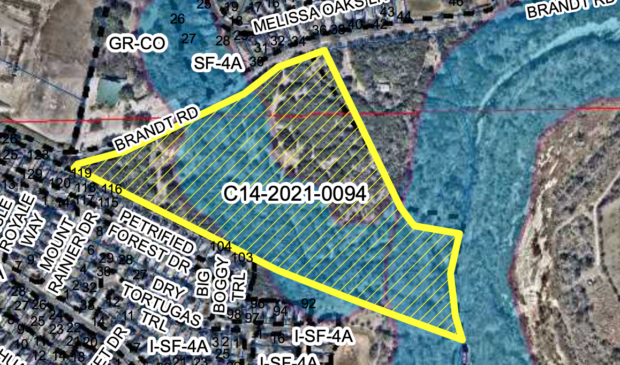ZAP fails to recommend rezoning for 100 percent affordable apartments
Tuesday, August 24, 2021 by
Jonathan Lee A tie vote at the Zoning and Platting Commission last Tuesday means that the rezoning for Fox Hollow, an affordable housing project, goes to City Council without ZAP’s recommendation.
Half of the commission sided with neighbors who say the site at 2117 Brandt Road in South Austin is not the place for dense development, while half supported the rezoning because of the need for more affordable housing – a split also seen in last week’s Luby’s rezoning case.
The project by LDG Development and the Housing Authority of the City of Austin would create approximately 200 family-sized apartments income-restricted at 60 percent median family income – around $59,000 for a family of four.
The neighbors opposed to the project brought a litany of concerns before the commission, though they were mainly worried about increased traffic along narrow, two-lane Brandt Road and worsened flooding, given the project’s proximity to floodplains. “This is the right cause, but the wrong location,” neighbor Jon Iken said.
Iken argued that the developer would put new and current residents alike at risk of floods and would be responsible for people walking on a dangerous street with no sidewalks. “LDG is playing a dangerous game with people’s lives and homes,” he said.
Five commissioners agreed with the neighbors and voted against the motion for city staffers’ recommendation of Multifamily-Low Density (MF-2) zoning. Though the developer requested Multifamily-Moderate Density (MF-4) zoning, representatives said MF-2 would still work, but the project would have 10 to 20 fewer units.
“This project just makes me queasy,” Commissioner Jolene Kiolbassa said. “I think that affordable housing, like everybody else, deserves … a better location than this.”
“I just don’t want to see families, low-income or not, put in harm’s way,” Commissioner Betsy Greenberg said. “This is a dangerous road and a site that’s basically surrounded by the floodplain on three sides.”
The five commissioners in favor of the rezoning were somewhat sympathetic to neighbors’ concerns, but emphasized the city’s desperate need for affordable housing.
“We’re in a crisis,” Commissioner Timothy Bray said. “Sometimes I even feel like Austin zoning cases are rearranging deck chairs on the Titanic with how bad it is.”
Commissioner Cesar Acosta argued that the case is a simple choice between allowing single-family homes or affordable apartments. “One way or another, this will get developed some way down the road, and I think we should allow it to be something that allows for a greater diversity of folks,” he said.
As with the Luby’s case, some commissioners argued that much of the concern was not pertinent to a zoning case.
“The flooding conversation is kind of frustrating to me, because we aren’t flooding experts,” Bray said. “Our job is to figure out zoning.”
City code has robust flood regulations. Homes cannot be built within a floodplain, for example, and multifamily projects must provide stormwater detention. “We are not putting anybody in harm’s way with this development,” Commissioner Hank Smith said. “We need to trust our staff.”
The project has taken a prolonged journey through the city’s discretionary approval process thus far. The case was postponed twice at ZAP so city staffers could prepare a preliminary traffic analysis to ease neighbors’ concerns – something not typically done during zoning cases. What’s more, Council last spring postponed recommending the project for state low-income housing tax credits – one of the main ways affordable housing becomes financially viable – after neighbors complained, only to recommend the project two months later on July 29.
The site is in Council Member Ann Kitchen’s District 5. Though Kitchen voted for the tax credits in July, she said she shared neighbors’ concerns about the project. Council will vote on the rezoning soon, though as of last week a hearing date had not been set.
The Austin Monitor’s work is made possible by donations from the community. Though our reporting covers donors from time to time, we are careful to keep business and editorial efforts separate while maintaining transparency. A complete list of donors is available here, and our code of ethics is explained here.
You're a community leader
And we’re honored you look to us for serious, in-depth news. You know a strong community needs local and dedicated watchdog reporting. We’re here for you and that won’t change. Now will you take the powerful next step and support our nonprofit news organization?



